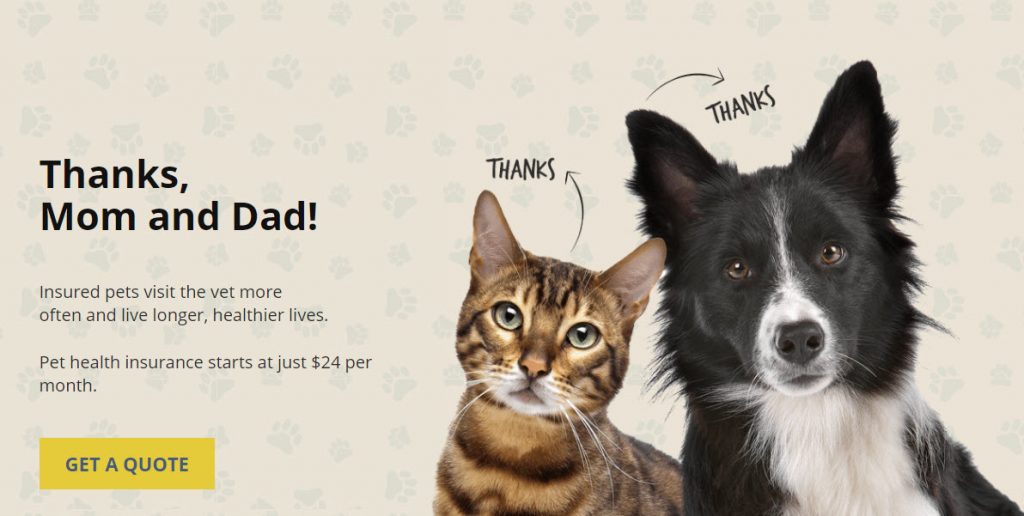Top Natural Remedies for Dog Diarrhea
Free Pet Insurance Comparison
Compare Quotes From Top Companies and Save
Secured with SHA-256 Encryption
Dr. Pippa Elliott BVMS, MRCVS
Veterinarian
Dr Pippa Elliott BVMS, MRCVS is a veterinarian with over 30 years of experience in companion animal practice. In 1987 she graduated from the University of Glasgow, with a degree in veterinary medicine and surgery. She works at Blythwood Vets and the People’s Dispensary for Sick Animals (PDSA). Pippa is an advocate of Fear-Free Practice, an animal addict, and a veterinary writer. She is also w...
Veterinarian
UPDATED: Dec 19, 2023
Pet Insurance U receives compensation from the third parties included on this site. This includes payment for clicks from our site to insurance providers’ sites and quote requests generated. Our rankings and reviews are not affected by payments from the insurance companies. The compensation we receive allows the site to be free and regularly updated. Our goal is to review every pet insurance provider, but not all companies are listed on the site.
And many of the companies we review do not pay us anything. We simply rate, compare and review their plan because we feel it will be valuable to you. Our reviews are guaranteed to be unbiased, professional and advertising compensation does not influence rankings.
We are a free online resource for anyone interested in learning more about pet insurance. Our goal is to be an objective, third-party resource for everything pet insurance related. We update our site regularly, and all content is reviewed by pet insurance experts.
UPDATED: Dec 19, 2023
Pet Insurance U receives compensation from the third parties included on this site. This includes payment for clicks from our site to insurance providers’ sites and quote requests generated. Our rankings and reviews are not affected by payments from the insurance companies. The compensation we receive allows the site to be free and regularly updated. Our goal is to review every pet insurance provider, but not all companies are listed on the site.
And many of the companies we review do not pay us anything. We simply rate, compare and review their plan because we feel it will be valuable to you. Our reviews are guaranteed to be unbiased, professional and advertising compensation does not influence rankings.
On This Page
Diarrhea is a defense mechanism that flushes toxins and irritants from the body. Pathogens from spoiled or bad food can quickly be eliminated before they are absorbed and potentially cause more damage.
Table of Contents:
Need Pet Insurance?
FACT: Pet insurance pays up to 90% of vet bills when your pet is sick or injured!
Natural Remedies for Dog Diarrhea
Diarrhea is not a disease, but a symptom of dysfunction in the digestive system. Dietary indiscretion and stressful situations are two of the most common causes of diarrhea in dogs. Most cases are self-limiting and simply run their course.
If an underlying cause for the diarrhea is identified it should be treated. Diarrhea can easily result in dehydration and electrolyte imbalances, which can be addressed with adequate water and the use of a bland diet or broth.
There are several ways to address your dog’s diarrhea at home. Simple cases typically resolve within 24 to 48 hours and require no to mild intervention.
If your dog is experiencing any of the following symptoms combined with diarrhea, it is appropriate to seek out veterinary attention before beginning any course of treatment or supportive care:
- Black, tarry stool
- Large amounts of fresh, bright red blood
- Decreased to absent appetite
- Lethargy
- Vomiting
- Abdominal distention or bloat
- The hunched appearance or protective of belly
- Vocalizations including increased panting and groaning, especially when the belly is touched
- Diarrhea that has persisted despite treatment for 48 hours or longer
- Puppies, small breed dogs, pregnant dogs, geriatric dogs, or those suffering from chronic conditions may need intervention sooner since diarrhea can quickly weaken and dehydrate these animals.
For dogs with uncomplicated, acute onset of diarrhea, the most common recommendation is to first rest the gastrointestinal system. Once the digestive system has had some time to recover, bland food can gradually be reintroduced.
Homeopathic and over-the-counter medications may be used under the guidance of a veterinarian.
Real Cost Savings from PetFirst Clients

Luna
PetFirst saved his parents
$6,712
A happy energetic Luna one morning couldn’t hold her food down. After months of multiple costly vet visits to specialists and an endoscopy, the problem was discovered and fixed. Luna put 22 pounds back on in no time and her parents were grateful for having PetFirst by their side to pay the bills.
Fasting for Dog Diarrhea
- Food
- Give no food for 6 to 12 hours, some recommend 24 hours*
- Water**
- If there is no vomiting, offer plenty of freshwaters to prevent dehydration, which is a common after-effect of diarrhea.
- If there is vomiting or you suspect an upset stomach, avoid water for the first few hours and then slowly offer small, increasing amounts.
*Puppies, small breed dogs, and those with some underlying medical conditions that may deplete glucose may also need to be supplemented during this time with small amounts of honey or Karo syrup every hour or as often as needed.
Hypoglycemia or low blood sugar may cause shakes or tremors and can become serious if not addressed.
If this is the first time your puppy or small dog has needed this type of intervention, please consult a veterinarian before attempting treatment.

**Some holistic veterinarians recommend using rice water instead of tap or filtered water.
Rice Water Instructions
Boil 1 cup of high-quality white rice (not Minute or brown rice) in 4 cups of water for approximately 30 minutes. Remove the water and allow it to cool.
Some dogs suffering diarrhea are nauseous or uninterested in drinking or eating. Adding a small amount of chicken broth or chicken baby food may increase your dog’s interest.
Related: 10 Things You Must Know Before You Buy Pet Insurance
Bland Diet
For the first four to five days following a bout of diarrhea, feed a bland food in gradually increased amounts. A mix of half white rice and half low-fat meat (chicken, lean ground beef) is an excellent, natural bland diet. As an alternative to meat, low-fat cottage cheese may also be used.
Avoid using foods with too much fiber at this stage, since it can actually worsen diarrhea. These bland diets are great for recovering from diarrhea but are not nutritionally balanced or adequate for long-term feeding.
Probiotics for Dog Diarrhea
Probiotics are live microorganisms that may be given to increase the amount of “good” bacteria inside the gastrointestinal tract. Maintaining the mucosal barrier of the gut wall and enhancing cellular repair within the gastrointestinal tract are two potential benefits.
Probiotics are especially helpful in preventing and limiting diarrhea when dogs are on antibiotics or experiencing a stressful event, such as boarding or traveling. Yogurt with live cultures may be used, but acidophilus cultures sold by many health food stores and veterinarians may be more effective in limiting diarrhea.
Probiotics can be purchased in a powdered form and added to your pet’s food or water. Most dogs do well with probiotics containing between 2 and 5 billion CFUs (colony forming units) per day.
Some dogs may actually experience an increase in diarrhea with certain types of probiotics or when administered higher levels of CFUs.
If the diarrhea is severe, you may want to consider an over-the-counter medication to help reduce fluid loss until the fasting, bland diet, and probiotics have a chance to work.
Pet owners preferring a natural course of therapy often avoid over-the-counter medications such as Kaopectate and Pepto Bismol because they contain salicylates.
Loperamide (Imodium) is an over the counter medication considered safe for use in pregnant humans. The published dose for loperamide in dogs is 2 mg for every 40 lbs of body weight no more than two to three times per day.
Loperamide can cause gas resulting in abdominal discomfort. Please note that Collie dogs are especially sensitive to loperamide, so never use it for longer than five days and only under the supervision of a veterinarian.
L-Glutamine
Amino acids can be used to help intestinal cells recover. L-Glutamine is a common amino acid used in dogs for this purpose. Recommended dosing is 500 mg per 25 lbs of body weight per day.
Several digestive support products sold for animal use contain L-Glutamine, so make sure to read labels before offering additional amounts.
Some dogs may experience abdominal discomfort and gas when starting amino acids. Consider starting with a reduced dose and gradually increasing to a therapeutic level. Be especially careful giving glutamine to dogs with seizures and epilepsy as they may have an increased risk of side effects.
Herbal Supplements
Slippery elm and Boswellia are available over the counter to treat diarrhea in humans. Some veterinarians have found success using these products in animals. The herbs are believed to reduce inflammation and protect mucous membranes.
Slippery elm can be purchased in powdered form and mixed with food or yogurt. The most commonly recommended dosage is 1/4 teaspoon per 10 lbs of body weight. Boswellia can be given at 2 1/2 teaspoons per 22 lbs of body weight once daily.
Enter your ZIP code below to view companies that have cheap pet insurance rates.
Secured with SHA-256 Encryption
Last Things about Dog Diarrhea
Keeping your dog current on vaccines and regularly treating for internal parasites with dewormers can decrease your pet’s risk for infectious diarrhea. Feeding a quality dog food can also reduce the chances for diarrhea secondary to intolerance.
Before beginning any at-home treatments for diarrhea it is wise to first consult a veterinarian familiar with your pet. Certain conditions may increase the risk associated with attempting to treat diarrhea at home.
In most cases, diarrhea will not be anything serious. After a few days, your pup will be back to normal.
In rare cases, you could end up with expensive vet bills, which is where pet insurance can save you trouble and a headache.
We have plenty of other tips and tricks for your dog over on our blog.
Other articles you may find helpful:
Is Exotic Pet Insurance Necessary?
The Best Pet Insurance By State
Fun Facts, Dog FAQ, And Unsolicited Dog Advice
5 Training Commands to Save Your Dog’s Life
The Ultimate Guide to Safe Foods for Dogs
We get it, your dog is like your child and when your puppy or dog has health problems it is scary. Luckily there is pet insurance companies that will help you pay for any veterinarian care they made need. Checkout the best puppy and dog pet insurance companies and learn about common puppy health issues and ailments in older pets.
Common Health Problems:
Chronic Active Hepatitis in Dogs
Cruciate Ligament Tear in Dogs
Degenerative Myelopathy | Spinal Cord Disease In Dogs
Dementia in Dogs | Canine Cognitive Dysfunction
Dog Comedones (Schnauzer Bumps)
Dog Diarrhea: What Can You Do To Help?
Gallbladder Obstruction in Dogs
Heart Murmurs In Dogs | How To Identify Them
Intervertebral Disc Disease In Dogs
Nasal Solar Dermatitis In Dogs
Progressive Retinal Atrophy In Dogs
The Dog Flu – Symptoms & Treatment for Canine Influenza


Frequently Asked Questions
How does pet insurance work, and what does it cover?
Pet insurance typically covers a percentage of veterinary bills when your pet is sick or injured. It can pay up to 90% of vet bills, depending on the policy. The coverage may include treatments, surgeries, medications, and other veterinary expenses. It is essential to review individual policies to understand specific coverage details.
Why should I consider pet insurance for my dog?
Pet insurance can help alleviate the financial burden of unexpected veterinary expenses. It allows you to provide necessary medical care for your dog without worrying about the full cost. This is particularly important in cases of illnesses, accidents, or emergencies.
Are there any specific recommendations for addressing dog diarrhea at home?
Yes, there are several home remedies for dog diarrhea, including fasting, bland diets, probiotics, and natural supplements. It is crucial to identify the cause of diarrhea and, if necessary, consult a veterinarian before starting any treatment. Severe cases may require medical attention.
How can I save on vet bills for my dog?
Pet insurance can be a valuable tool to save on vet bills by covering a significant portion of the expenses. Additionally, maintaining your dog’s health through regular veterinary check-ups, vaccinations, and preventive care can reduce the risk of costly illnesses.
Is the information on natural remedies for dog diarrhea reliable?
The information on natural remedies for dog diarrhea is provided as a general guide. However, individual dogs may respond differently to treatments. It is advisable to consult with a veterinarian for personalized advice based on your dog’s health condition and medical history.
What should I do if my dog’s diarrhea persists or worsens?
If your dog’s diarrhea persists or worsens, it is essential to seek veterinary attention promptly. Chronic or severe diarrhea can indicate underlying health issues that require professional diagnosis and treatment. Avoid prolonged home remedies if there is no improvement.
Can I use over-the-counter medications for my dog’s diarrhea?
Some over-the-counter medications, such as loperamide (Imodium), may be used under veterinary guidance to manage dog diarrhea. However, it is crucial to follow recommended dosages and consult with a vet, especially for specific breeds that may be sensitive to certain medications.
How can pet insurance save me trouble and headaches in the long run?
Pet insurance provides financial assistance for unexpected veterinary expenses, saving you from the financial burden and allowing you to prioritize your pet’s health. It ensures that you can provide necessary medical care without worrying about the full cost, avoiding potential stress and headaches.
What factors should I consider when choosing pet insurance for my dog?
When choosing pet insurance, consider factors such as coverage limits, deductibles, reimbursement percentages, waiting periods, and any exclusions. Reviewing customer reviews and comparing quotes from different insurance companies can help you make an informed decision tailored to your dog’s needs.
Enter your ZIP code below to view companies that have cheap pet insurance rates.
Secured with SHA-256 Encryption
Dr. Pippa Elliott BVMS, MRCVS
Veterinarian
Dr Pippa Elliott BVMS, MRCVS is a veterinarian with over 30 years of experience in companion animal practice. In 1987 she graduated from the University of Glasgow, with a degree in veterinary medicine and surgery. She works at Blythwood Vets and the People’s Dispensary for Sick Animals (PDSA). Pippa is an advocate of Fear-Free Practice, an animal addict, and a veterinary writer. She is also w...
Veterinarian
We are a free online resource for anyone interested in learning more about pet insurance. Our goal is to be an objective, third-party resource for everything pet insurance related. We update our site regularly, and all content is reviewed by pet insurance experts.


